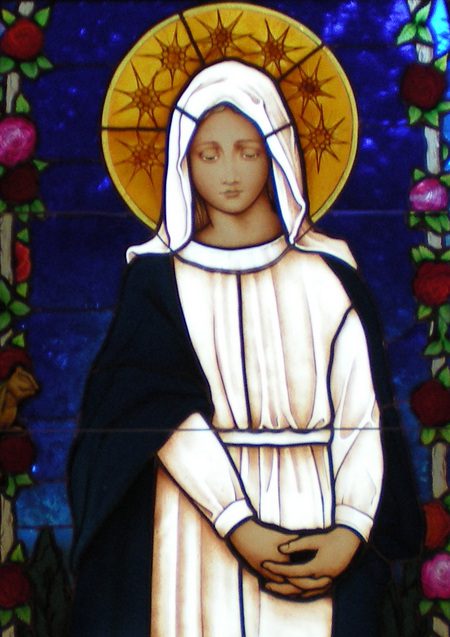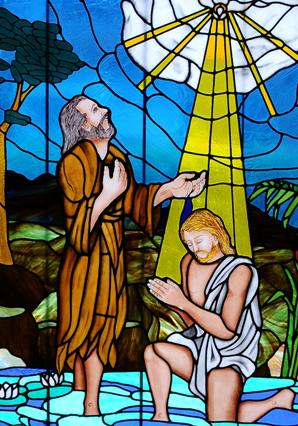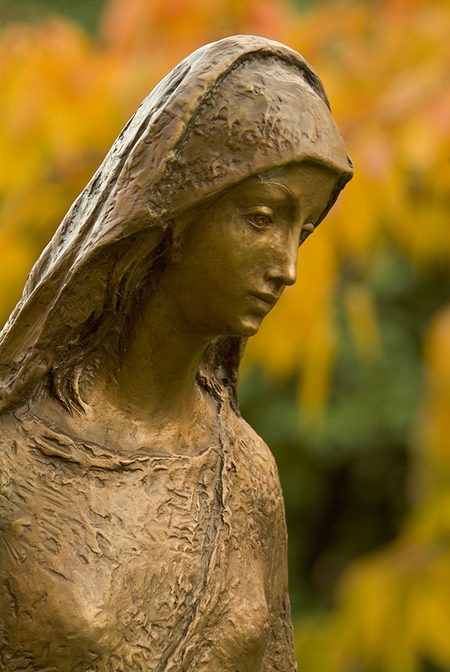We understand a bit of the emotion called motherly love, this love of a mother for the children she has brought to life. Motherly love leads her to always think about them and work to assure their happiness. This is but a faint picture of what Mary feels for all people, and the love she bears for us, since she became our mother and she adopted us as her children.
– Blessed Basil Moreau, Sermon on the Blessed Mother
There is no one we can trust more to guide us in our lives of faith and in our discernment of our vocation than our mother, Mary. As we pray in the Memorare, “Remember, O most gracious Virgin Mary, that never was it known that anyone who fled to thy protection, implored thy help, or sought thy intercession was left unaided.” Mary is the mother of all vocations, especially to priesthood and religious life because as mother of the Church she is concerned for her ministers.
From her own experience, particularly in the Annunciation, Mary can help us not only to hear the voice of God, but also to have the courage, trust, and faith to give our own fiat. That is why Blessed John Paul II consecrated his vocation and his whole life to the Blessed Mother under his apostolic motto, Totus tuus (which means “totally yours”). It came from the prayer of Saint Louis of Montfort: Totus tuus ego sum, et omnia mea tua sunt (“I am all yours, and all that I have is yours”).
In addition to seeking Mary’s intercession through Hail Marys and Memorares whenever doubts and fears begin to threaten us in our discernment, two important ways we can pray with Mary for our vocations are through a daily consecration to her and through the Rosary.
Daily Consecration to Mary
It is important to pray with Mary daily for our lives and specifically for our vocations, entrusting them to her. Certainly, we can seek to consecrate our lives to Mary and seek her intercession in our own words, but there are also formal prayers of consecration to Mary. The following prayer comes from the Holy Cross Directory of Devotional Prayers:
Consecration Prayer

O my Mother and Patroness, Holy Mary,
Rosary

In the Rosary, we pray with Mary and, through meditating on the mysteries,invite herto lead us more deeply into the life of her Son, whom we seek to follow and imitate. The more we know Christ, His life, and His mission, the more we are able to find our vocations within Him.
In particular, the Luminous Mysteries – the Baptism of the Lord, the Wedding at Cana, the Proclamation of the Kingdom, the Transfiguration, and the Institution of the Eucharist – are powerful to meditate upon in discernment because they dive into Jesus’ own call and mission. In fact, they have been called by some the “vocational mysteries.”Here are some short reflections on the Luminous Mysteries to use while praying the Rosary:
The Baptism of the Lord
Jesus did not need to be baptized to have any personal sins forgiven, but His submission to baptism by John was a further example of His humility and another way in which He set an example for His followers. At Jesus’ baptism, the voice of the Father was heard naming Him and an appearance of the Spirit was seen, to show forth His true identity and to prepare the way for the beginning of His time of public ministry.
In our own baptisms, when we truly become Christians and members of the Church, we are initiated into the priesthood, prophethood and kingship of Jesus Christ our Head, to follow Him and, strengthened by His Spirit, to strive to further His mission. Baptism initiates us into the universal mission of the Church, which is to spread the Good News for the salvation of souls, and also into the individual vocations which God has stored up for each one of us. No two vocations are exactly alike, just as no two paths towards holiness are exactly alike. It is the duty and honor of each Christian to pray and discern where that vocational call from God is leading. God pours out the Spirit on us and calls us by name at Baptism, and we pray for the grace and strength to follow.
The Wedding at Cana
Mary knew that Jesus was destined for something extraordinary, even if the full extent of the glory of that promise, and the suffering that would have to be endured along the way, only became clear to her little by little. She knew Him better than any other living person. She had spent more time with Him than anyone, and somehow she knew that at this wedding – of friends and neighbors who had run out of wine – Jesus was meant to begin to make manifest the promise of abundance already witnessed to by a virgin giving birth. God’s grace comes not only where preparation has been made, where we expect Him to act, but sometimes most powerfully in the place where people might say, “See, they weren’t prepared for the feast.”
Jesus’ own reaction to His mother’s words to the servant, “Do whatever he tells you,” seems to suggest that He doubted or hesitated to act right away. It might have seemed that it was too soon to begin to do public miracles or too imprudent to make such power manifest in such a mundane setting. They had merely run out of wine. Shouldn’t more be at stake for Jesus’ first miracle? Jesus surely knew that His time of staying in the background was coming to an end and that soon He would have to leave home to once again, publicly, be about His Father’s business. His mother’s words heralded His entry into ministry and affirmed the movement of the Spirit, according to the will of the Father, within His own heart. Sometimes it takes the words of another to prompt us onto the actions we knew we must eventually take.
The Proclamation of the Kingdom
Jesus spent much more of His time proclaiming the dawning of the Kingdom than explaining explicitly to people who He was. He seems to have preferred to let others realize this on their own, in virtue of Jesus’ teaching and actions. He asks Peter, “Who do you say that I am?” but also tells Him repeatedly to “feed my sheep.” He uses multiple parables to explain what the Kingdom is like: a mustard seed, a treasure hidden in a field, a merchant who finds a pearl or a king who comes to settle accounts with his subjects. In short, as our faith tradition tells us, the Kingdom is “already, but not yet” -dawning, but not yet fully realized. There is certainly a lot of work to do before the dawn turns completely to day!
Jesus said to His disciples, “The harvest is abundant, but the laborers are few. Pray to the Master of the Harvest to send out laborers for the harvest.” The harvest is God’s, and He has no need of us. Yet we know that our God has constantly invited us to share in His work, as a sign of love and mercy, even as we acknowledge that the strength to do the work comes from Him. We pray for laborers and pray that we will recognize when the call to labor is addressed to us.
The Transfiguration
When Jesus took Peter, James and John up the mountain and was shown to them in His glory, witnessed to by the Father and flanked by the great prophets, it was only natural that the three apostles would react with fear and awe. Who was this man, Jesus, really? If this was His true nature – not that they had necessarily doubted it before but that now they were realizing it more deeply than ever -how could they ever hope to accompany Him? Peter may well have recalled the first words He ever spoke to Jesus, “Depart from me, Lord, for I am a sinful man.” And so He was. Even after this graced experience, Peter still denies Jesus three times. But Peter’s sinfulness does not deter Jesus’ call to Him; it only demonstrates the dependence that Peter must place in the Lord if He is to have any hope of serving faithfully. He knows he cannot serve worthily-if he is to rely only on his own merits-but he can hope to serve faithfully.
We, too, can be tempted to despair of serving faithfully because of our sinfulness. We pray each time beforereceiving the Holy Eucharist, “Lord, I am not worthy to receive you, but only say the word, and I shall be healed.” We are not worthy for Jesus to enter under our roofs, it is true, but He enters anyway, if we are brave enough to believe that He will save us and strengthen us. Jesus’ Cross is strong for it bore the weight of the world’s sins. If we hand over our struggles to His Sacred Heart, we know that in the end He will take them away and make us pure before we enter into the glory He has promised us-the glory where we too will shine cleaner than any fuller can bleach. Jesus did not call those already sanctified, but sanctified those whom He called, and sanctifies those He calls still.
The Institution of the Eucharist
The Eucharist is the heart of Christian worship. It is Jesus’ sacramental presentation of His total gift of self and His invitation to us to share in His life. We all partake, are strengthened, and then are sent to serve our neighbor and to give glory to God. For it is from this “sending” that the Mass takes its name, from the dismissal command to go in peace to serve. The Eucharist strengthens us to carry out the mission we were given in Baptism and is the central place of Christ’s presence among us, to encourage us and to comfort us. Yet we are not comforted for our own sakes alone, but even more so that we can more effectively reflect His image and become like Him.
So then the question is not whether to serve, but how, where, and with whom. What are my gifts, and what are my weaknesses? Am I called to serve as a member of a family, as a parent? Or as a member of a religious family, as one vowed to poverty, chastity and obedience among brothers? Or as a member of the clergy of my local church, as a diocesan priest or deacon? We are all called to partake of the Eucharistic table, but some are called to be ministers at that table. How will I live out Christ’s command to “do this in memory of me”?
You can get more online Rosary resources from the Congregation of Holy Cross’ ministry, Family Rosary.
Learn more about Catholic teachings about Mary, the Mother of God, on the United States Conference of Catholic Bishops’ website.




